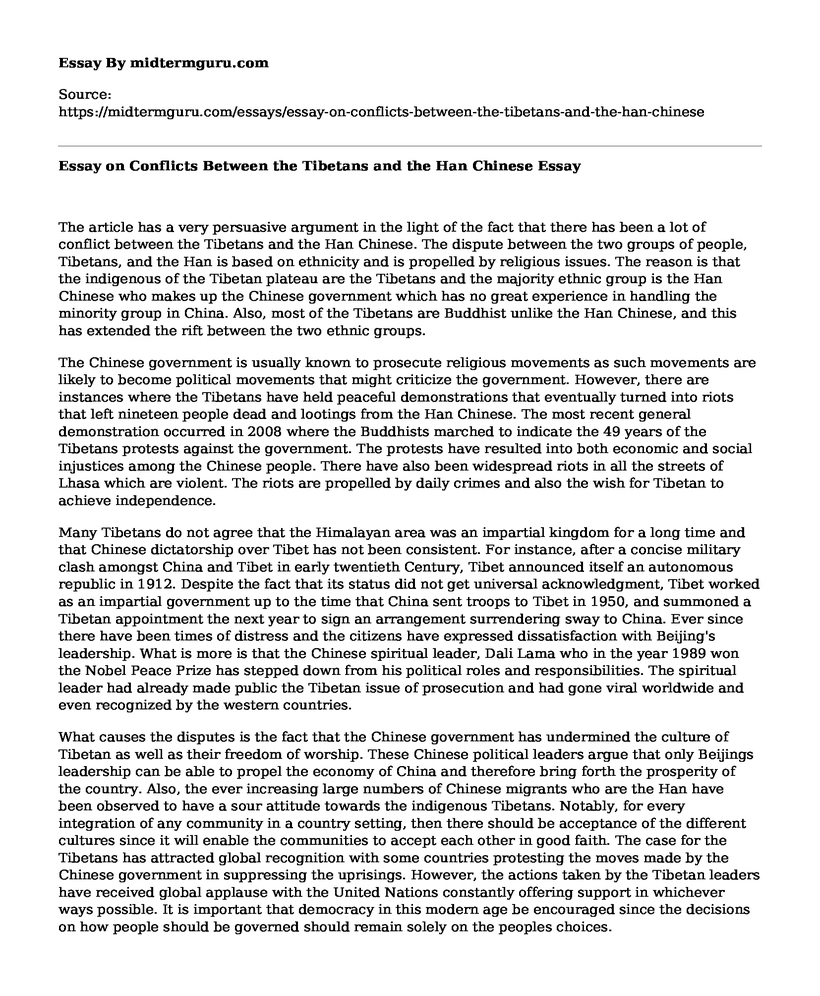The article has a very persuasive argument in the light of the fact that there has been a lot of conflict between the Tibetans and the Han Chinese. The dispute between the two groups of people, Tibetans, and the Han is based on ethnicity and is propelled by religious issues. The reason is that the indigenous of the Tibetan plateau are the Tibetans and the majority ethnic group is the Han Chinese who makes up the Chinese government which has no great experience in handling the minority group in China. Also, most of the Tibetans are Buddhist unlike the Han Chinese, and this has extended the rift between the two ethnic groups.
The Chinese government is usually known to prosecute religious movements as such movements are likely to become political movements that might criticize the government. However, there are instances where the Tibetans have held peaceful demonstrations that eventually turned into riots that left nineteen people dead and lootings from the Han Chinese. The most recent general demonstration occurred in 2008 where the Buddhists marched to indicate the 49 years of the Tibetans protests against the government. The protests have resulted into both economic and social injustices among the Chinese people. There have also been widespread riots in all the streets of Lhasa which are violent. The riots are propelled by daily crimes and also the wish for Tibetan to achieve independence.
Many Tibetans do not agree that the Himalayan area was an impartial kingdom for a long time and that Chinese dictatorship over Tibet has not been consistent. For instance, after a concise military clash amongst China and Tibet in early twentieth Century, Tibet announced itself an autonomous republic in 1912. Despite the fact that its status did not get universal acknowledgment, Tibet worked as an impartial government up to the time that China sent troops to Tibet in 1950, and summoned a Tibetan appointment the next year to sign an arrangement surrendering sway to China. Ever since there have been times of distress and the citizens have expressed dissatisfaction with Beijing's leadership. What is more is that the Chinese spiritual leader, Dali Lama who in the year 1989 won the Nobel Peace Prize has stepped down from his political roles and responsibilities. The spiritual leader had already made public the Tibetan issue of prosecution and had gone viral worldwide and even recognized by the western countries.
What causes the disputes is the fact that the Chinese government has undermined the culture of Tibetan as well as their freedom of worship. These Chinese political leaders argue that only Beijings leadership can be able to propel the economy of China and therefore bring forth the prosperity of the country. Also, the ever increasing large numbers of Chinese migrants who are the Han have been observed to have a sour attitude towards the indigenous Tibetans. Notably, for every integration of any community in a country setting, then there should be acceptance of the different cultures since it will enable the communities to accept each other in good faith. The case for the Tibetans has attracted global recognition with some countries protesting the moves made by the Chinese government in suppressing the uprisings. However, the actions taken by the Tibetan leaders have received global applause with the United Nations constantly offering support in whichever ways possible. It is important that democracy in this modern age be encouraged since the decisions on how people should be governed should remain solely on the peoples choices.
Cite this page
Essay on Conflicts Between the Tibetans and the Han Chinese. (2021, Jul 02). Retrieved from https://midtermguru.com/essays/essay-on-conflicts-between-the-tibetans-and-the-han-chinese
If you are the original author of this essay and no longer wish to have it published on the midtermguru.com website, please click below to request its removal:
- What Happened to Abigail Williams - Essay Sample
- Essay Sample on Heroes in the Society
- Essay Sample on America in the 1780s
- Deep Dive Into Policy Discussions: All-Inclusive Collaboration - Essay Sample
- Criminal Justice Policies: Theories, Ideologies & Ethical Issues - Essay Sample
- Government Econ Policies Ensure Financial Security for Citizens - Essay Sample
- The Role of Gender and Religion During the American Colonial Period - Essay Sample







